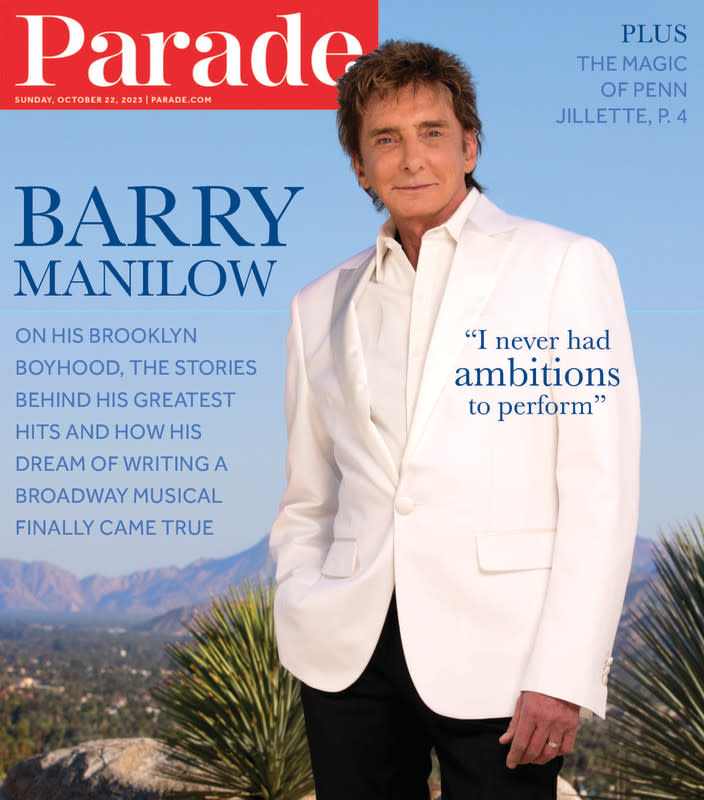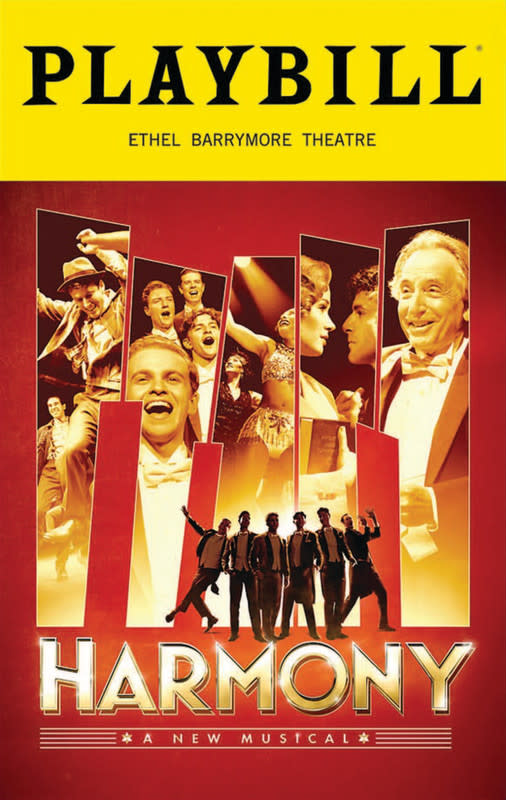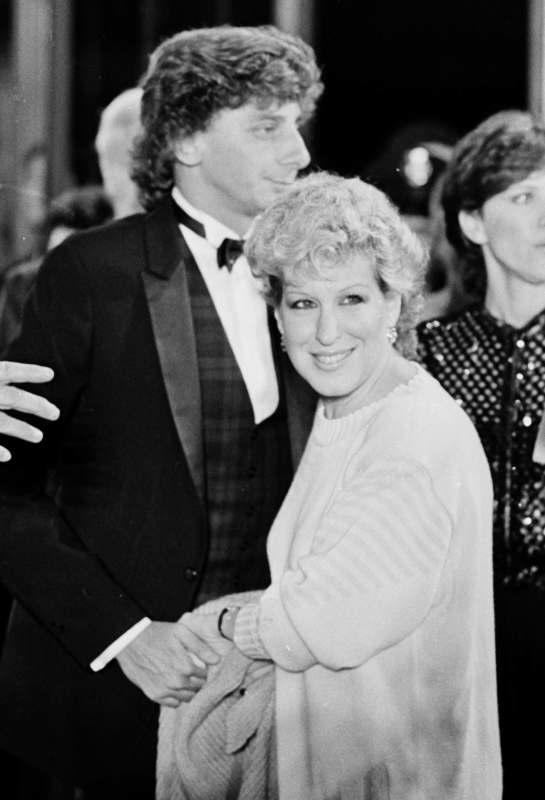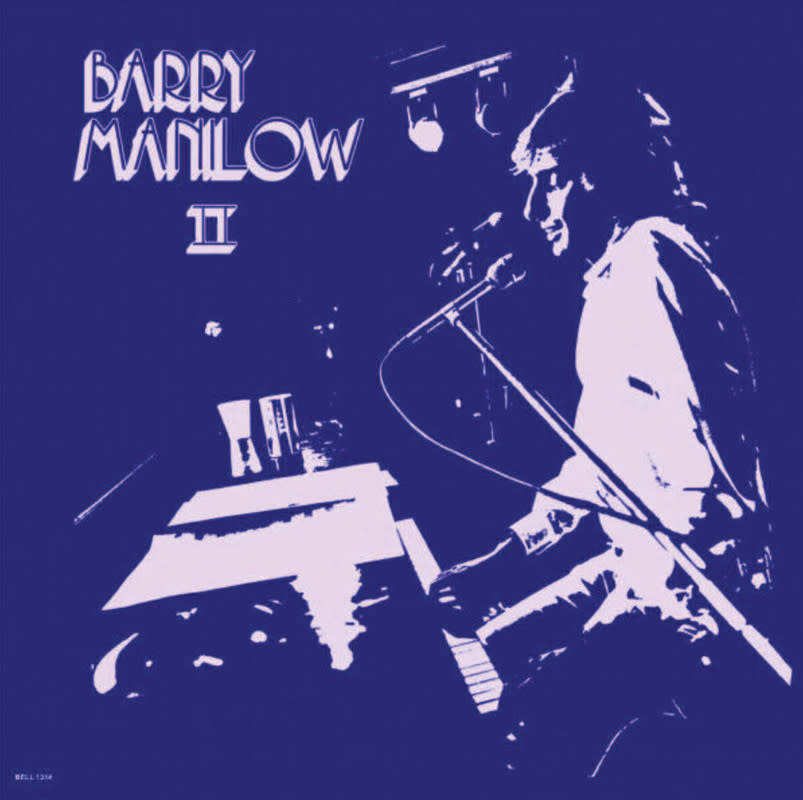Barry Manilow's Long Road to Broadway

Barry Manilow doesn’t need much downtime.
I never sleep,” he says. “I get four hours a night. That’s all I really need. It’s been that way for years.”
That’s not surprising, perhaps, for a guy from the city that’s said to never sleep, a place that’s running full throttle all the time. “When you start out in New York, you’re always a New Yorker,” he says, admitting it’s true even though he’s lived on the West Coast for more than two decades. “I just have a lot of energy; I talk fast, I think fast. Maybe it’s because New Yorkers are always moving, scrambling to get a seat on the subway or something.”
He’s not scrambling these days for many subway seats, especially in Palm Springs, Calif., the Sonoran Desert resort town where he’s talking with Parade from the recording studio of his spacious home. “It’s very hot, but it’s beautiful,” he says, turning his gaze to a nearby window. “Blue skies and mountains and lots of palm trees.” As he speaks, his two beloved Labrador Retrievers, Jake and Abbey, bark for his attention.

COVER PHOTOGRAPHY BY RICHARD MCLAREN
All those non-sleeping hours over all the decades and all that Big-Apple energy have given Manilow, who recently turned 80, more waking time to enjoy the scenery, love on his dogs—and mostly, make more music. In his durable career as a singing, songwriting, hit-making master showman, he’s chalked up sales of some 85 million albums and released nearly 60 singles, including a bucketful that were No. 1, Top 10 and Top 40 radio hits, including “Mandy,” “Looks Like We Made It,” “It’s a Miracle,” “I Write the Songs,” “Can’t Smile Without You” and “Copacabana.” He’s been honored with nearly every award possible, including a Grammy, a Tony and an Emmy (actually, two of them). And he was even nominated for an Oscar, for “Ready to Take a Chance Again,” a song he performed for the soundtrack of the 1978 Chevy Chase/Goldie Hawn comedy Foul Play. Billboard magazine has called him as the No. 1 Adult Contemporary entertainer of all time.
Related: Get the Stories Behind 15 of the Most Memorable Oscar-Winning Best Original Songs
Since 1974, he’s hit the charts with 25 different songs. On TV, he’s hosted nearly 20 prime-time specials; he played himself in episodes of Murphy Brown, Will & Grace and Ally McBeal, and starred in a movie based on “Copacabana,” his biggest hit. Somewhere in there, he transitioned from showbiz success to entertainment icon, becoming an enduring emblem of dependably mellow, infectiously pleasing, timelessly Manilow-ic pleasantness that now continues into the 21st century (his songs are so mellow, authorities in one Australian town played them on speakers to deter gangs from gathering).
Despite Manilow’s wide-ranging success, a particular lifelong goal has been out of his reach, until now. Later this year, he’ll finally see the opening of a Broadway musical—his Broadway musical. Harmony, in previews now and set to raise the curtain Nov. 13 at the Ethel Barrymore Theater, is based on the true story of The Comedian Harmonists, a wisecracking singing group in Germany prior to World War II—when the Nazi regime made life much more difficult for the act’s Jewish members.

Playbill
“They were like The Manhattan Transfer meets the Marx Brothers,” says Manilow, the composer and arranger of the music for the production, along with longtime songwriting collaborator, Bruce Sussman, who wrote the lyrics. The Broadway opening has been a long time coming, he says, noting that he and Sussman began the project 25 years ago. Harmony eventually played around the country, beginning in 1997 in California, but it wasn’t until now that it reached New York City’s legendary theater district—with a full cast and a Tony-winning director, Warren Carlyle, attached.
“I’ve been on Broadway twice,” he says. “But always as a performer; this is the first time as a composer of a bigger musical, and it’s been one of my dreams to do that. Having Harmony open on Broadway is going to be the highlight of my career.”
Show Tune Roots
Composing original music for the Broadway show brought him full circle to his childhood. Manilow was born Barry Pincus in 1943 and grew up in a working-class section of Brooklyn, a place where “everyone was poor,” he says. (He changed his last name to Manilow, his mother’s maiden name, after his father left them and she remarried.) An accordion, then a miniature piano—a spinet—awakened his musical talent, which was later fueled by his stepfather’s record collection, heavy with Broadway soundtracks like Oklahoma!, Brigadoon and Carousel. Those big, splashy orchestrated show tunes shaped his earliest musical instincts. “What was on the radio was junk,” he says, “compared to everything else I loved.”
He was voted “Most Musical” in his senior class at Brooklyn’s now-defunct Eastern District High School, and after graduation, he married his high-school sweetheart, Susan Deixler. Their friends didn’t think it would last, and it didn’t; they split after a year, and the marriage was annulled. In the breakup and division of property, Manilow made sure he got the piano.
After attending New York City’s prestigious The Julliard School for performing arts, he found work as a pianist for Broadway rehearsals, then was hired to write, sing and record commercial jingles. Before America knew his name, they heard him crooning on the radio and TV about State Farm Insurance (“Like a good neighbor…”), bandages (“I am stuck on Band-Aid…”), McDonald’s (“You deserve a break today…”), KFC, Pepsi and other products. He learned early in the jingle factory—the recording studios for all those advertising spots—how to make a good song; he absorbed everything he could from older, more experienced engineers, producers and musicians, finding out what worked and what didn’t. “I learned it’s got to be catchy enough to get on the radio, catchy enough for people to remember,” Manilow says.
Then he met Bette Midler in the early stages of her ascension to musical stardom. She hired the young piano-pounding prodigy as her accompanist, bandleader and producer for her breakthrough album, The Divine Miss M, and her tour. When Manilow got an offer to record an album on his own, it surprised them both. “I called Bette and said, ‘I think I just got a record deal…’” he says. “She said, ‘Doing what?’ I said, ‘Singing.’ She said, ‘But you don’t sing!’ I said, ‘I know! But they think I do.’”
Related: Bette Midler Talks Music Memories, Her New Children's Book and Why She Deserves Retirement

Getty Images
His first album, Barry Manilow, in 1973, was a bit of a flop. “It sold, like, five copies,” Manilow says; actually, it was about 35,000, but still a commercial disappointment. “There were some very nice songs on there. But it was kind of a relief. I could go back to doing what I really wanted to do, which was not singing.” Yes, one of the most successful of all singing stars admits he felt out of his league as a headliner, behind a microphone, in front of audiences. Remarkably, he still does. “I never had ambitions to perform,” he says. “It surprises me to this day that I’m still doing it, because I don’t think of myself as a singer or a performer. I’m a musician. And performing and singing—it’s always a surprise that anybody likes it.”
Soon he found out a lot of people were liking it. In 1974, his second album, Barry Manilow II, provided a breakout smash with “Mandy.” Having a hit record was truly life- changing; the waves of newfound fame came crashing so hard and fast that he tried disguising himself to avoid the crush of fans and remain unnoticed in public. “I put cotton in my mouth, like Marlon Brando” in The Godfather, he says. But people recognized him anyway. “They thought I’d had dental work.”

AMG
And the rest is musical history: a long stand of radio hits, worldwide acclaim, five decades of recording and performing. The improbability isn’t lost on him today—that a Brooklyn kid with an accordion could go from a tiny tenement apartment to become a world-famous superstar. How did that happen?
“Beats the sh-- out of me,” he says with a chuckle, adding he’s never been one to dwell on the past, or question how or why. “I don’t think like that. I just think about the next thing,” he says. “There’s always the next thing with me; I’ve always got two or three projects in the pipeline. And it’s always been like that.”
Another thing he’s always done is give back. He’s never forgotten those early days of barely getting by when his family scraped to afford to buy him an accordion, then a tiny piano. For most of his career, he’s helped youth and leaders pump up their musical programs, with concerts this summer again raising money for deserving music teachers and schools. The Manilow Music Project has been generating funding since 2008 “to keep dreams alive one instrument at a time.”
“As a performer, you give back,” he says. “I gave back as much as I could as soon as I started making some money. And I still do.”
Bigger Than Elvis?
After this summer’s tour dates, he headed to Las Vegas, as he’s done for the past 14 years, and where he’s bigger—and even busier—than Elvis. Manilow’s long-term residency at the Westgate Las Vegas Resort & Casino, in the heart of the world-famous Vegas strip, unfailingly attracts sellout crowds of die-hard “Fanilows.” The hotel has a different name now, but he plays the same showroom where the King once held court in the 1970s—and where Manilow recently broke Presley’s previous record of 636 performances.
Earlier this year, he was honored by the esteemed New York Pops in a special black-tie event for the organization’s 40th anniversary, and he got rave reviews for his five nights of shows, with a 50-piece orchestra, at Radio City Music Hall this summer. He marked his 80th birthday at one of his shows by wobbling onstage with a walker—a joke about becoming a newly minted octogenarian—as fans showered him with robust birthday greetings. The birthday blowout was planned by Manilow’s longtime manager, Garry Kief. They’ve been together now for 45 years and were officially married in 2014; Manilow didn’t officially “come out” as gay until a few years later, in a 2017 cover story for People. “He’s such a good guy and he’s so smart,” he says of Kief. “He takes good care of me. I’m a really lucky guy.”
He knows he’s lucky, too, to have not just stayed afloat over the decades, but to have thrived. In addition to Harmony opening in New York—“It’s going to be the most exciting night of my life”—Manilow has finished recording a new batch of songs for an upcoming album and will release four new seasonal tunes in December. With all of his projects over the years, he just hopes people say, “He made me feel good,” he says. “That’s what I would like.”
Next, See Inside the $10.375 Million Malibu Beach House Formerly Owned by Barry Manilow
